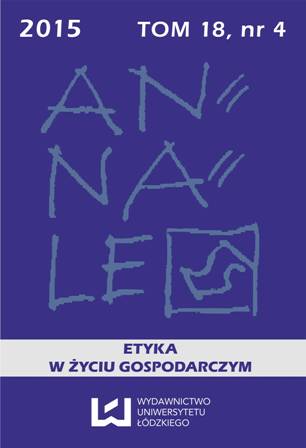Economics as a Discipline of Instrumental Reason. Looking at Economics as a Science from the Perspective of the Frankfurt School of Philosophy
DOI:
https://doi.org/10.18778/1899-2226.18.4.05Słowa kluczowe:
Frankfurt School of Philosophy, economics, HorkheimerAbstrakt
The article is built around the analysis of The critique of instrumental reason by Horkheimer, applied to issues connected with the philosophy of economics. Positive economics is under-stood as an example of a discipline where the pragmatic paradigm has been implemented. Therefore, economics functions within the boundaries of what Horkheimer called instrumental rationality. The starting point is the intellectual source shared by economics and the Frankfurt School, namely Kant’s philosophy of rationality. In the first part of the article, three of Kant’s ideas that are fundamental to economics are presented, and then the development of their application in philosophy of science, as seen by Horkheimer in 1947, is laid out. The second part of the article consists of enumerating various distinctive features of economics that set it apart from other social sciences and which constitute factors for which it can be considered a realm of the reign of ‘instrumental rationality’, with all the threats such an approach provokes. The above-mentioned features concentrate on treating humans in economics as a means, not as a goal. This aspect of the philosophy of science of the Frankfurt School (unlike its critique of capitalism as an economic system) has not been widely received.Bibliografia
Dzionek-Kozłowska J., Ekonomia jako nauka pozytywna. Refleksje na marginesie “Ekonomii dobra i zła” Tomasa Sedlacka, “Annales, Etyka w Życiu Gospodarczym” 2013, No. 16, pp. 335–344.
Google Scholar
DOI: https://doi.org/10.18778/1899-2226.16.24
Dzionek-Kozłowska J., R. Matera, Ethics in Economic Thought. Selected Issues and Various Perspectives, Lodz University Press & Jagiellonian University Press, Lodz-Cracow 2015, pp. 81–89.
Google Scholar
DOI: https://doi.org/10.18778/7969-687-1
Horkheimer M., Krytyka instrumentalnego rozumu, Scholar, Warsaw 2007.
Google Scholar
Horkheimer M., T. Adorno, Dialektyka Oświecenia. Fragmenty filozoficzne, Wydawnictwo IFiS PAN, Warsaw 1994.
Google Scholar
Keynes J.M., Economic Possibilities for Our Grandchildren [in:] Essays in Persuasion, Macmillan, London 1931, pp. 358–374.
Google Scholar
Korsgaard C., The Constitution of Agency: Essays on Practical Reason and Moral Psychology, Oxford Scholarship Online, Oxford 2009, pp. 25–99.
Google Scholar
DOI: https://doi.org/10.1093/acprof:oso/9780199552733.001.0001
Kuderowicz Z., Czy Kant wierzył w postęp? [in:] Kant wobec problemów współczesnego świata, eds. J. Miklaszewska, P. Spryszak, Jagiellonian University Press, Cracow 2006, pp. 13–17.
Google Scholar
McLuhan M., Zrozumieć media: przedłużenia człowieka, Wydawnictwa Naukowo-Techniczne, Warsaw 2004.
Google Scholar
Miklaszewska J., Kantowska utopia racjonalności [in:] Kant wobec problemów współczesnego świata, eds. J. Miklaszewska, P. Spryszak, Jagiellonian University Press, Cracow 2006, pp. 75–86.
Google Scholar
Stewart H., A Critique of Instrumental Reason in Economics, “Economics and Philosophy” 1995, Vol. 11, pp. 57–83.
Google Scholar
DOI: https://doi.org/10.1017/S0266267100003229
Pobrania
Opublikowane
Jak cytować
Numer
Dział
Licencja

Utwór dostępny jest na licencji Creative Commons Uznanie autorstwa – Użycie niekomercyjne – Bez utworów zależnych 4.0 Międzynarodowe.









